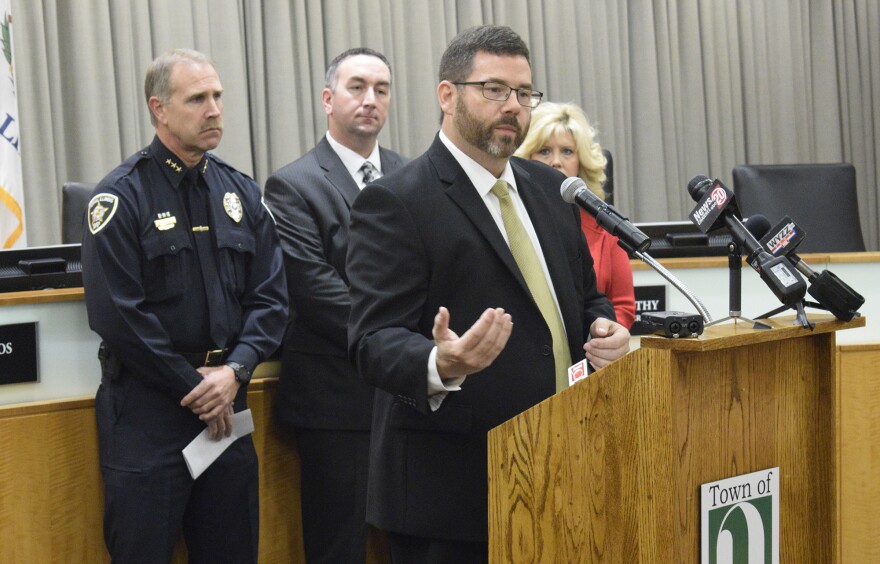In November 2021, police arrested a 16-year-old at Bloomington High School after a school resource officer allegedly found a loaded gun and additional ammunition in the student’s backpack. Following the arrest, prosecutors asked that the student be tried as an adult. A judge ultimately agreed, and the case is now in adult court.
McLean County State's Attorney Don Knapp can't comment on the student’s case specifically. But Knapp said prosecutors weigh several things before asking for adult charges in the case of a juvenile offender.
“The two biggest determining factors are the seriousness of the event of the crime and the criminal history of the minor,” Knapp said.
Knapp maintains it would be difficult to argue that a student who carries a loaded gun into a school wouldn’t satisfy at least some of the criteria.
“Bringing guns into school ever since Columbine — I don't know that anybody thinks it's not serious,” he said.

In fact, it's all too easy to confirm just how serious it can be. Just weeks before the Bloomington student was taken into custody, a 15-year-old in Michigan opened fire at his high school, killing four people. The suspect in that case, Ethan Crumbly, also will be tried as an adult.
The two cases do differ in important ways. The Michigan suspect is accused of mass murder while the Bloomington student has not been accused of harming anyone. Following his arrest, Bloomington school officials said there had been no threat of violence. At a later bond hearing, a family spokesperson argued against the decision to charge the student as an adult. There were no victims, said the spokesperson, claiming the state was making an example of the student because he is Black.
But Knapp, speaking generally, said anytime time a gun is brought into a school, it represents a threat.
“Even if it's empty,” he said. “Nobody knows. It is an incredibly dangerous situation.”
Knapp’s office has “no tolerance” for guns in school and as far as he can tell, that’s a position that well-supported in the community.
Granting that a student who brings a gun to school must be held accountable, the question then becomes how. And central to that question is whether an underage student should be tried as a juvenile or as an adult.
Elizabeth Clarke is the founder of the Juvenile Justice Initiative, an Evanston-based nonprofit. Clarke has been working for years to drive down juvenile transfer rates — the number of juveniles being tried on adult charges. Clarke argues adult courts have the capacity only to punish whereas the juvenile justice system is designed not just to hold offenders accountable, but to rehabilitate them.
“Children's brains don't fully develop until (the age of) 25,” Clarke said. “And so, there's a great capacity — not just that they should be held less criminally responsible — but also that they have greater potential to change."

Clarke said that potential for change is why the overarching aim of the juvenile justice system is rehabilitation. Unlike adult court that determines guilt and metes out punishment, the juvenile system takes a more holistic approach to accountability. It’s set up to determine not only who commits a crime, but also why did they did it, and what can be done to prevent it from happening again, said Clark.
Rather than focusing primarily on punishment, the juvenile justice system is designed to drill down to the root causes of criminal behavior. Clarke said answering the question of why improves outcomes not only for the child, but also makes for a safer society. Without examining why crimes are committed or violence occurs, the cycle is doomed to repeat itself.
In the case of a student who brings a gun into school, asking why could involve an examination of several factors surrounding the student's actions.
Dr. Charles Bell is an associate professor of criminal justice at Illinois State University. Bell grew up in Detroit in a neighborhood riddled with violence. Growing up, he struggled to envision himself surviving past high school.
Bell said that’s the lived experience of a lot of kids, especially Black students. The trauma that occurs outside of school — at home or in violent neighborhoods — can lead to a feeling of constant vulnerability. And the presence of traditional safety measures meant to make a school feel more secure can actually have the opposite effect for minority students.
“I think the sort of setup that we have in public schools where we assume law enforcement officers are indicative of safety really just shows the degree to which minority students and their experiences are ignored,” Bell said.

Schools are increasingly reliant on school resource officers (SRO) to promote and enforce safety. SROs are sworn law enforcement officers, often from local departments, who have arrest powers. Officers are frequently armed.
Minority students may have a variety of reasons for not turning to an SRO for help, said Bell. Students may think: “I don't feel comfortable talking to a law enforcement officer because this person has a gun. Or, it could be that hey, my first experience with law enforcement officers, I saw my dad or someone else get beat up by a law enforcement officer and there was an aggressive use of force there,” Bell explained.
Bell did not speak directly to the case of the BHS student, but said generally that schools fail to protect Black students. And that can sometimes lead to situations where students feel the need to protect themselves.
No one interviewed for this story made the argument that students who bring guns to school should not be held accountable. The question at stake is how much the circumstances surrounding the crime should be considered. And for advocates like Clarke, the only forum in which circumstances can be properly considered is in the juvenile system.
Knapp, the state’s attorney, acknowledges that requesting a juvenile be charged as an adult is a difficult decision.
“You have to look at the entire picture and it can be a complicated equation,” he said.
Increasingly for prosecutors, that equation is adding up to the decision to charge fewer juveniles as adults. A 2021 study from the Illinois Juvenile Justice Commission found the number of juvenile transfers is trending steadily down. But when it comes to guns in schools, Knapp said it’s simply too serious a crime.
“If there's a faction of this community that thinks we should be lenient on taking a gun to school, I haven't heard from them yet,” he said.

